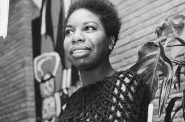The White Ribbon rattles our beliefs
At the very beginning of The White Ribbon, over a black screen, the narrator’s voice tells us that he isn’t sure that what we are about to see is entirely true. He acknowledges that it is a particular point of view and that memory can sometimes be deceptive and certainly selective. This disclaimer seems to neatly sidestep any responsibility for what follows and is the first painfully human act in what proves to be a frightening human parable.
We are then immediately plunged into the kind of blank stare realism that Austrian director Michael Haneke has developed to a high art. Haneke’s immaculate staging and cinematographer Christian Berger’s starkly simple compositions, drained of color to the point of appearing black and white and lit seemingly by nature itself, leave us to focus only on the people living within the frames.
In short, the story is about the children and teenagers of a choir run by a schoolteacher in a Protestant northern Germany village in the early 1900s.
Those people, who appear at first to be victims of a series of irrational and significantly cruel crimes, are slowly revealed to be, if not directly complicit in those crimes, certainly deserving of some degree of retribution for their abhorrent behavior toward each other and particularly toward their children. And whereas the mystery of who is committing these crimes is never solved (as would be typical in a Hollywood film), by the end we suspect that the children — innocent, blond, playful and curious — may be the culprits. We blame them, and we fear them. But not like the Children of the Corn fantasy children, but like our own, because we made them.
The point has been made that since The White Ribbon takes place in Germany, on the eve of the assassination of Archduke Ferdinand and the beginning of WWI, the children are of the generation that will grow up to embrace Hitler and allow for the murder of millions of Jews, gypsies and homosexuals. We are right to fear them. Perhaps, we should fear them now.
Haneke’s The White Ribbon — winner of three awards at the 2009 Cannes Film Festival — is a great film because it stares with uncompromising and impassive eyes at a world that is filled with tiny horrors that, ignored, are about to become catastrophic.
The White Ribbon opens Friday, Feb. 26, at the Oriental Theatre.
Movies
-
Milwaukee Film Festival Returns in April
 Mar 27th, 2024 by Sophie Bolich
Mar 27th, 2024 by Sophie Bolich
-
Nina Simone’s Summer of Soul
 Nov 29th, 2022 by John Sieger
Nov 29th, 2022 by John Sieger
-
The Surprise Pick for Best Picture
 Mar 22nd, 2022 by Dominique Paul Noth
Mar 22nd, 2022 by Dominique Paul Noth
























Thanks, Mark, for a piece that gets at Haneke and captures his style in words. — Tom Strini